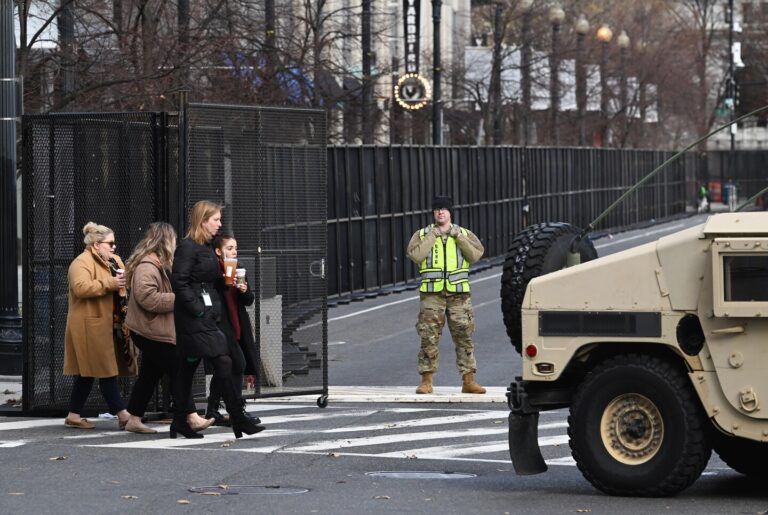“Monday through Thursday our business was off by about 45 percent. Pretty bad,” said Oliver Cox, who with his wife is co-owner of Pearl’s Bagels on 7th Street NW, just outside the fenced-in security perimeter for the summit. To get to their shop, Cox said, customers had to walk around the fence, wind their way through concrete barriers and skirt past a National Guard Humvee. Most didn’t bother to make the effort. “It was pretty desolate,” he said.
Cox, who also lives in the neighborhood, said they had to cut staff for the week. The planning, he said, could have been much better.
“Not a lot of people knew this was coming at least not in a way that was that disruptive,” he said.
Roads were closed off most of the week in the neighborhood bordered by O and K streets NW, and 6th and 10th streets NW. Parking restrictions extended beyond the perimeter on many nearby streets. D.C. Mayor Muriel E. Bowser requested operational support from the D.C. National Guard on Dec. 9 just ahead of the summit, which was held from Tuesday through Thursday, and brought leaders from across Africa to Washington to meet with top American officials including President Biden.
Security fencing around the perimeter meant residents had to be screened by law enforcement officers to get to their homes. And visitors who wanted to get to businesses or the many bars and restaurants in the neighborhood had to do the same. Uber and Lyft drivers steered clear of the cordoned off blocks and deliveries were severely hampered. Many restaurants removed delivery as an options. Others restaurants canceled office holiday parties because getting there would have been too difficult for guests.
“It was an extraordinary three days,” said Rachelle Nigro, vice chair of the Advisory Neighborhood Commission 6E. She said there was a similar event at the convention center in 2016 but there were fewer businesses and residents in the neighborhood at that time.
“We have a denser population now and for people who are newer to the District, it was a lot,” she said. “When you see basically several blocks fenced in completely it can leave you shocked. It was very challenging for the residents and the businesses.”
Eric Ziebold, the owner and chef of Kinship, also on 7th Street NW, said business was down 30 percent last week. Many diners canceled reservations at the Michelin-rated restaurant when they realized how challenging it would be to get to the restaurant, he said. The restaurant also reached out to customers to let them know in advance what they would be facing and offered to rebook their reservations.
Garbage is typically picked up every day at the restaurant but trash trucks couldn’t make their way past security barriers and it was four days before trash could be hauled, Ziebold said. Limiting trash pickup brought other problems to the neighborhood.
“I’m sorry, I hate to be blunt, but D.C. is ranking very high in rodent infestation and this past week is certainly not helping the cause,” he said.
Ziebold said information was provided in advance but it changed over time. “The plan wasn’t communicated very well.”
District officials acknowledged the heavy security presence for the summit and said Friday the mayor would engage with local businesses to better understand the impact the event had.
“The District of Columbia is host to numerous large and complex special events on an annual basis. National Special Security Events, such as the US-Africa Leaders Summit, require higher levels of security and we understand that there may be some impacts to the community,” Gabe Lugo, spokesperson for D.C. Homeland Security and Emergency Management Agency, said in a statement. “The Mayor’s office and public safety agencies work closely with the U.S. Secret Service and other law enforcement partners to anticipate, mitigate, and communicate these impacts. The Mayor’s office is engaging local businesses to learn more about their experience this past week, we appreciate this feedback so that community engagement can be optimized for future events.”
Eric Eden, the owner of the Unconventional Diner on 9th Street NW, said his business took a 65 to 70 percent hit last week because of the closures.
Eden said he was aware of what to expect and knew that getting across the District would be difficult during the summit.
It is debilitating to the city and it did affect some of us, Eden said. “Entry points were hard to find and making your way to our business was difficult.”
But Eden also said that contending with the inconvenience of a neighborhood shut down is part of living in the capital city.
“Street closures are common place for large scale events,” he said. “The longer you live and work here the less surprised you are by these types of things affecting your business.”
Of the city’s preparation efforts Eden said he thought “they did the best they could to let us know what was coming.”
He encouraged city residents who weren’t able to visit the neighborhood during the summit to come back soon and support local businesses.
“It will help make up for loss revenue in a very trying time,” Eden said.



